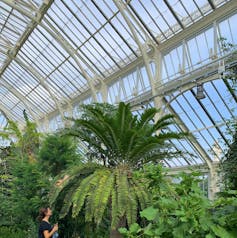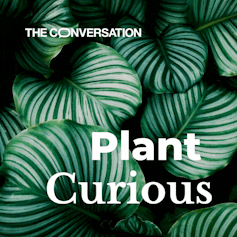The only known specimens of Encephalartos woodii (E. woodii), a species of cycad, are all clones of the same male plant found over 100 years ago in a South African forest.
Now a team of researchers is on a mission to find an elusive female version of the plant, with the help of drones and artificial intelligence.
In this episode of The Conversation Weekly podcast, we speak to Laura Cinti, a research fellow at the University of Southampton in the UK, about her determined quest to save the species – called the world’s “loneliest” plant.
As one of the rarest plants in the world, E. woodii is highly sought after among collectors and botanists. Laura Cinti likens the cycad to a relic from a time bygone.
They’ve been around since before the time of dinosaurs. They were once widespread, but today they are actually the most threatened and the most endangered plants on our planet.

The only known wild specimen of E. Woodii was discovered in 1895 by the botanist John Medley Wood while he was on an expedition in the Ngoye Forest in South Africa. All the plants in existence today in botanical gardens around the world are clones of this same specimen.
E. woodii is prized for its striking appearance, with a scaly trunk and large, long fronds that form a majestic crown, like a palm tree. On top sit golden cones, used for reproduction. The cones on the male plant are generally more elongated and those on the female plant, rounder and more egg shaped, explains Cinti.
Cycad reproduction relies heavily on this fascinating interaction between insects where the pollen gets transferred from the male cone to the female cone. Without a female, pollination or sexual reproduction is not possible.

Many people think of plants as nice-looking greens. Essential for clean air, yes, but simple organisms. A step change in research is shaking up the way scientists think about plants: they are far more complex and more like us than you might imagine. This blossoming field of science is too delightful to do it justice in one or two stories.
This story is part of a series, Plant Curious, exploring scientific studies that challenge the way you view plantlife.
Cinti is fascinated by the plight of this cycad, which is vulnerable to disease or other environmental stresses because of its limited gene pool. So she assembled a team to search for a female version of the species.
We were driven the hope of that a female E. woodii might still be out there, because as far as we know, the Ngoye Forest, where it was originally discovered, hasn’t been completely explored.
While all previous searches of the forest had been done on foot, Cinti’s team had access to modern technologies. They’ve been using drones and remote sensing technology to take pictures of the forest and have also trained an AI model to help identify if any of the pictures they’ve taken could be of E. woodii.
Listen to our conversation with Laura Cinti on The Conversation Weekly podcast to find our more about her search for a female partner for the world’s loneliest plant.
A transcript of this episode is also available.
This episode of The Conversation Weekly was written and produced by Mend Mariwany with assistance from Katie Flood. Sound design was by Michelle Macklem, and our theme music is by Neeta Sarl. Gemma Ware is the executive producer.
Thanks to Laura Cinti for sending recordings of the drones used in the search in the Ngoye Forest in South Africa.
You can find us on Instagram at theconversationdotcom or via email. You can also subscribe to The Conversation’s free daily email here.
Listen to The Conversation Weekly via any of the apps listed above, download it directly via our RSS feed or find out how else to listen here.![]()
Gemma Ware, Host, The Conversation Weekly Podcast, The Conversation
This article is republished from The Conversation under a Creative Commons license. Read the original article.